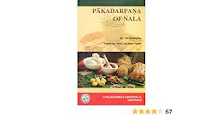Pākaśāstra (पाकशास्त्र) refers to the “science and art of cooking”, as explained in the 17th century Bhojanakutūhala, a work dealing with the ancient Indian principles of dietetics and culinary art.—Food assumes utmost importance among the three basic needs of human life, the other two being clothing and shelter. The role of food is evident in constituting growth and development of all living beings. The science upon the food substances is also equally important. Indians had realized this significant role of food in human life even in the early phases of their development. The concept of deification can be seen even in the annasūkta of Ṛgveda. The Sanskrit sources of ancient India indicate eminent contributions in the field of dietetics (pathyāpathya-nirṇaya) and in the science and art of cooking (Pākaśāstra and Pākakalā).
Ayurveda prescribes many daily food items
as drugs in various medicinal formulations. Thus, Indian cooking is known for
its medicinal properties. There are various dietary preparations (patthya
kalpanās) explained in Ayurveda with specific indications of diseases and
treatment methods. On the other side, there are various classic books written
exclusively on cookery like Bhojana kutūhalam by Raghunātha
Pandita, kṣemakutūhala by Kṣemaśarman, Pākacandrika by Annaji
Ballala Bapata Indurakara Vaidya and Śiva tattva ratnākara. Pāka
darpaṇam is one such Indian text on traditional cooking written by King
Nala of Niṣidha kingdom. Pāka literally means cooking or cooked
food and darpaṇa means mirror. Thus title indicates that the work
reflects the cooking methodologies.
King Nala, husband of queen Damayantī was a well-known cook in Indian
epics, so much so that any delectable preparation of food is still eponymously
termed to be nala pāka.
The first chapter is titled as granthopakrama deals
with the qualities of ideal cook and waiter (pariveṣaka) and elaborately
explains different origin. It lists a total both vegetarian and nonvegetarian
food preparations of of 16 kinds of dishes viz. odana (cooked
rice), sūpa (preparation of de-husked legumes), sarpis (ghee), vyañjaka (side
dish), māṁsa (meat) and śāka (vegetables), bhakṣya (munchable
eatable), pāyasa (milk pudding), rasāyana (rejuvenative), pāna (drinks), yūṣa (preparation
popularly known as khichḍi), different rice preparations such as curd
rice, ghee rice etc., lehya (lickables), pānīya (water), kṣīra (milk)
and takra (butter milk).
The chapter claims that anna (cooked rice) has 63 tastes and eight
defects. The author has enumerated only eight defects and but not the tastes.
The eight defects of cooked rice are asṛtānnna (rice preparation
using rice whose qualities go against the season), paicchilyānna (over
cooked, sticky rice), kwathitānna (only little quantity of rice taken
for cooking and boiled), śuṣkānna (dried cooked rice), dagdhānna (burnt
rice), virūpānna (cooking rice without proper size and shape),
and anaṛtujānna (rice against the season or stale cooked rice).
Further the author explains the method of cooking of rice. Rice which is
unpounded, dry and older should be taken and should be washed in hot water. A
vessel should be taken and should be added with three parts of water. The
vessel should be placed on fire. When water slightly boils up, the washed rice
should be put in the vessel. When rice starts boiling, it should be stirred
using a spoon repeatedly. At the same time, milk, butter milk or water should
be sprinkled. Then the vessel should be taken out from fire for some time and
again kept for boiling till it is cooked and smooth. This rice is good for
longevity and health.
Bhima the middle one of the Pandavas was also famous for his cookery. He became as a great chef, while banished from the kingdom by Duryodhana and lived in the outskirts as incognito, in the palace of the King Virata, with the name Vallbha.
शरीरमाद्यं खलु धर्मसाधनम्। This is a quote from the Sanskrit Classic
Kumarasambhava of Kalidasa, explains about the need to focus on the health
first (Meaning: react to your body needs) rather than doing other unwanted
things. It suggests to do any work if
your body is fit to do that. This is the
motto of AIIMS.
To have a healthy body few routines are must to follow.
समये भोजनं निद्रा समये स्नानमाचरेत्। व्यायामं समये कुर्यात् यमो भीतो
गमिष्यति ।।
This
quote insists to have food, sleep, exercise and bath at fixed time. By following these chances of good health
both physically and mentally doubles.
"यथाऽऽहारः तथा बुद्धिः"
- You are what you eat; and "आहारप्रमादः सर्वप्रमादः"- Total attraction towards food
leads to disaster.
The Bhagavad Gita Says, we should be regular in
diet, recreation, exercises, assigned activities and sleep.
युक्ताहारविहारस्य युक्तचेष्टस्य कर्मसु। युक्तास्वप्नावबोधस्य योगो भवति दुःखहा।। (17- VI)
(This blog post is a part of Blogchatter's #BlogchatterA2Z2023)








No comments:
Post a Comment